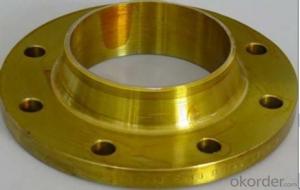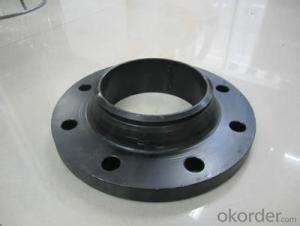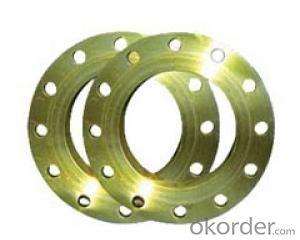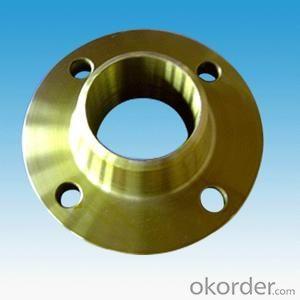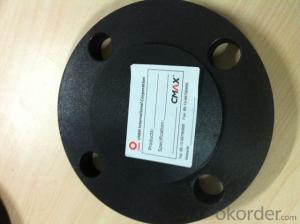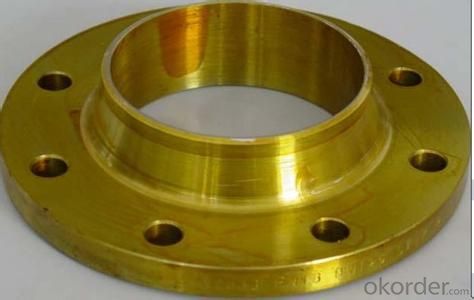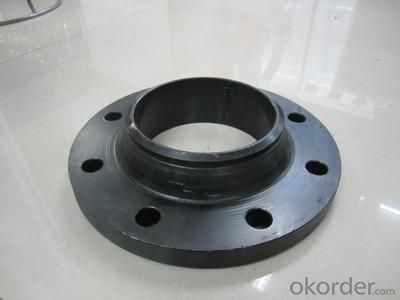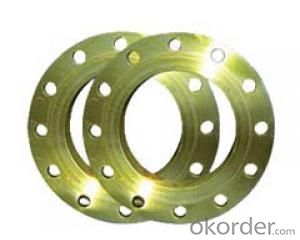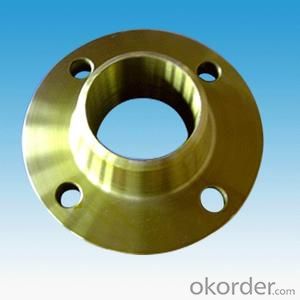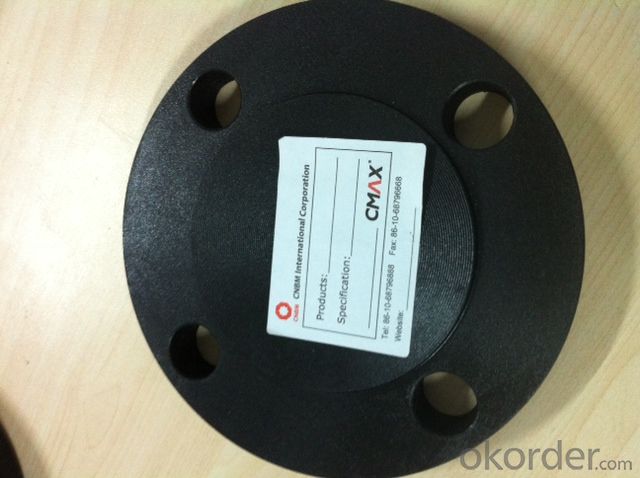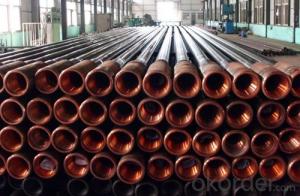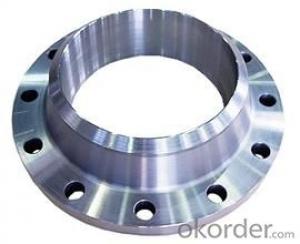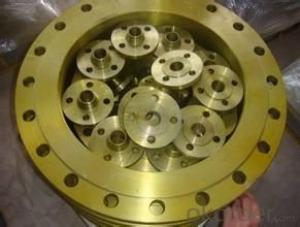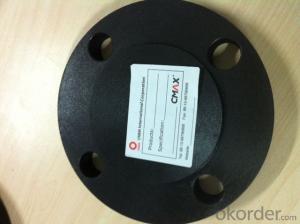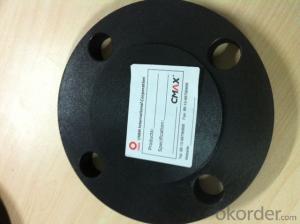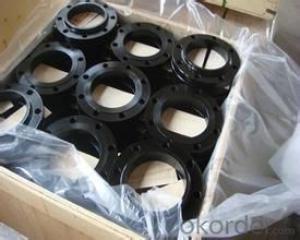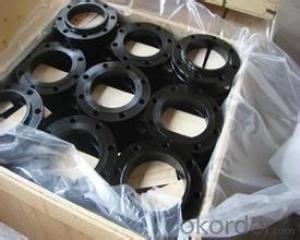CARBON STEEL PIPE FORGED FLANGES A105 ANSI B16.5 BEST PRICE
- Loading Port:
- Tianjin
- Payment Terms:
- TT OR LC
- Min Order Qty:
- 1 pc
- Supply Capability:
- 10000 pc/month
OKorder Service Pledge
OKorder Financial Service
You Might Also Like
Package Of Carbon Steel Flange:
PACKED IN PLYWOOD CASES OR PALLETS
Painting Of Carbon Steel Flange:
BLACK OR YELLOW PAINTING FOR CARBON STEEL
Marking Of Carbon Steel Flange:
REFER TO MARKING DOCUMENT or AS PER CUSTOMER REQUEST
Shipping Marks Of Carbon Steel Flange:
EACH WOODEN BOX TWO PLASTIC SHIPPING MARKS
Specification Of Carbon Steel Flange:
Carbon Steel Flange Slip On Flange, Plate Flange, Blind Flange, Welding Neck Flange, Socket Welded Flange, Thread Flange, Lap Joint Flange, Long Welding Neck Flange
Size : 1/2"-48"
Wall Thickness.: SCH10-SCH160, SGP , XS, XXS, DIN ,STD
| Name | Carbon Steel Flange |
| Size | 1/2" - 48" |
| Face | RF, FF, RTJ |
| Wall thickness | Sch5-Sch160 XXS,STD,XS, SGP |
| Standard | ASME B16.5, B16.47, BS4504, JIS B2220, API 6A, 11Detc. |
| We can also produce according to drawing and standards provided by customers. | |
| Material | ASTM A105, A350 LF1, LF2, F11, F12, St35.8, St45.8, 15Mo3etc, |
| Packaging | Wooden Cases, wooden pallet , or carton box , or nylog bag and then in wooden cases |
| Surface Treatment | Paintting black or yellow color, or Anti-rust Oil |
| Delivery Time | 20-30 days, after received advance payment. |
| Quality | 100% Heat Treatment, No Welding repair |
| Others | 1.Special design available according to your drawing. |
| 2.anti-corrosion and high-temperature resistant with black painting | |
| 3. All the production process are made under the ISO9001:2000 strictly. | |
| 4. A conformity rate of ex-factory inspection of products. | |
| 5. we have export right , offering FOB , CNF CIF price |
STANDARD & MATERIAL GRADE
STAMDARD Of Carbon Steel Flange
| Standard | Pressure | Size | |
| European Standard | EN 1092-1 | Class PN6 ~ PN100 | DN10 ~ DN4000 |
| American Standard | ASME B16.5 | Class 150 ~ 2500 | 1/2" ~ 24" |
| ASME B16.47A | Class 150 ~ 900 | 26" ~ 60" | |
| ASME B16.47B | Class 75 ~ 900 | 26" ~ 60" | |
| German Standard | DIN 2527,2566,2573, 2576, 2627-2638,2641,2642,2655,2656 | PN6~PN100 | DN10 ~ DN4000 |
| Australian Standard | AS2129 | Table: T/A, T/D, T/E, T/F, T/H, T/J, T/K, T/R, T/S, T/T | DN15 ~ DN3000 |
| AS4087 | PN16 ~ PN35 | DN50 ~ DN1200 | |
| British Standard | BS4504 | PN2.5 ~ PN40 | DN10 ~ DN4000 |
| BS10 | T/A, T/D, T/E, T/F, T/H | 1/2" ~ 48" | |
| Japanese Standard | JIS B2220 | 5K ~ 30K | DN10 ~ DN1500 |
| API Standard | API 6A, 11D | 2000 PSI ~ 20000 PSI | 1 13/16" ~ 30" |
| French Standard | NFE 29203 | PN2.5 ~ PN420 | DN10 ~ DN600 |
MATERIAL Of Carbon Steel Flange
| Carbon Steel | ||
| Material Standard | Material Grade | |
| ASTM | ASTM A105 | A105, A105N |
| ASTM A350 | A350 LF1, LF2 | |
| ASTM A182 | F11, F12, F22 | |
| ASTM A106 | A, B, C | |
| DIN EN | DIN17175 | St35.8, St45.8, 15Mo3 |
| EN10216-2 | 195GH,P235GH, P265GH, 20MnNb6 | |
| JIS | JIS G3461 | STB340,410,510 |
| JIS G3462 | STBA12, 13, 20, 22, 23, 24 | |
| JIS G3454,G3455,G3456 | STPG 370, STB410, STS370,410, 510 | |
| STPT 370, 410, 480 | ||
- Q: How do steel pipes compare to ductile iron pipes?
- Steel pipes and ductile iron pipes have some similarities, such as being durable and strong materials for piping systems. However, there are a few key differences between the two. Steel pipes are typically lighter and more flexible, making them easier to handle and install. They also have a higher resistance to corrosion and can withstand higher pressure and temperature conditions. On the other hand, ductile iron pipes have a higher tensile strength and are more resistant to impact and vibration. Overall, the choice between steel and ductile iron pipes depends on specific project requirements, such as the intended application, location, and budget constraints.
- Q: How are steel pipes used in the manufacturing of HVAC systems?
- Steel pipes are commonly used in the manufacturing of HVAC systems for various purposes. They are used to transport fluids, such as water or refrigerants, throughout the system. Steel pipes are also used for exhaust systems and ventilation, providing a durable and corrosion-resistant solution. Additionally, steel pipes are used in the construction of HVAC equipment, such as heat exchangers and boilers, due to their strength and ability to withstand high temperatures and pressures. Overall, steel pipes play a crucial role in the efficient and reliable functioning of HVAC systems.
- Q: What is the difference between hot dip galvanized steel pipe and galvanized steel pipe?
- The difference between the process is that the hot dip galvanized pipe is dipped in the molten zinc bath and the galvanized pipe is plated with a metallic surface by means of unidirectional current in the plating bath. Hot plating process is fast, the coating is thick and consumes more zinc. Ordinary galvanized slow speed, thin coating.
- Q: How long do steel pipes typically last?
- Steel pipes typically last for several decades to over a century, depending on factors such as the quality of the steel, environmental conditions, and maintenance practices.
- Q: Can steel pipes be used for the construction of transmission towers?
- Yes, steel pipes can be used for the construction of transmission towers. Steel pipes are commonly used in the construction industry due to their strength, durability, and ability to withstand various weather conditions. They provide a reliable and cost-effective solution for supporting the weight and load of transmission towers, making them suitable for this purpose.
- Q: Can steel pipes be used for underground geothermal systems?
- Indeed, underground geothermal systems can utilize steel pipes. Given their robustness and longevity, steel pipes are frequently employed in geothermal systems. They can endure the elevated temperatures and pressures inherent in the extraction and distribution of geothermal energy. Moreover, steel pipes exhibit excellent resistance to corrosion, a crucial attribute when contending with the subterranean milieu and the diverse array of minerals and chemicals present in the soil. Furthermore, steel pipes possess versatility, enabling straightforward underground installation and connection, rendering them a fitting selection for geothermal systems.
- Q: Can steel pipes be used for transporting gases?
- Yes, steel pipes can be used for transporting gases. Steel pipes are known for their strength, durability, and resistance to corrosion, making them an ideal choice for transporting various gases over long distances. Additionally, steel pipes can handle high pressure and extreme temperatures, ensuring the safe and efficient transportation of gases.
- Q: How can galvanized steel pipe be connected with stainless steel pipe?
- Welding methods are used to connect. Because galvanized pipe is in fact carbon steel pipe, so galvanized pipe and stainless steel pipe welding, in fact, carbon steel and stainless steel welding, welding of dissimilar materials.
- Q: What are the factors to consider when selecting pipe materials for corrosive environments?
- When selecting pipe materials for corrosive environments, there are several important factors to consider in order to ensure the longevity and effectiveness of the piping system. 1. Corrosion Resistance: The most crucial factor to consider is the corrosion resistance of the pipe material. It is essential to choose a material that is highly resistant to corrosion, as corrosive environments can cause significant damage to pipes over time. Materials such as stainless steel, fiberglass, and certain types of plastics like PVC and CPVC are known for their excellent resistance to corrosion. 2. Chemical Compatibility: It is important to assess the chemical compatibility of the pipe material with the specific corrosive environment it will be exposed to. Different materials have different resistance levels to various chemicals, so it is crucial to ensure that the chosen material can withstand the specific chemicals present in the environment. Consulting chemical compatibility charts and seeking expert advice can help in making the right material selection. 3. Temperature and Pressure Requirements: The temperature and pressure conditions within the corrosive environment should also be considered when selecting pipe materials. Some materials may have limitations in terms of their temperature and pressure resistance, and exceeding these limits can lead to pipe failure. It is important to choose a material that can handle the required temperature and pressure ranges without compromising its structural integrity. 4. Cost: The cost of the pipe material and its installation should also be taken into account. While certain materials may be highly resistant to corrosion, they can also be more expensive. It is essential to strike a balance between the desired level of corrosion resistance and the available budget. 5. Maintenance and Durability: The maintenance requirements and overall durability of the pipe material should be evaluated as well. Some materials may require more frequent inspections, cleaning, or repairs compared to others. Considering the anticipated lifespan of the piping system and the ease of maintenance can help in selecting a material that will provide long-term reliability and cost-effectiveness. In conclusion, when selecting pipe materials for corrosive environments, one should consider factors such as corrosion resistance, chemical compatibility, temperature and pressure requirements, cost, and maintenance and durability. By carefully evaluating these factors, one can choose a pipe material that best suits the specific corrosive environment and ensures a reliable and long-lasting piping system.
- Q: What is the difference between steel pipes and fiberglass-reinforced pipes?
- The main difference between steel pipes and fiberglass-reinforced pipes lies in their composition and structural characteristics. Steel pipes are made of a durable metal alloy, typically carbon steel, which provides strength and resistance to high pressure and temperature. On the other hand, fiberglass-reinforced pipes are composed of a plastic matrix reinforced with glass fibers, making them lightweight, corrosion-resistant, and suitable for various applications. While steel pipes are commonly used in industrial settings, fiberglass-reinforced pipes are often utilized in sectors requiring corrosion resistance, such as chemical processing, wastewater treatment, and oil and gas industries.
Send your message to us
CARBON STEEL PIPE FORGED FLANGES A105 ANSI B16.5 BEST PRICE
- Loading Port:
- Tianjin
- Payment Terms:
- TT OR LC
- Min Order Qty:
- 1 pc
- Supply Capability:
- 10000 pc/month
OKorder Service Pledge
OKorder Financial Service
Similar products
Hot products
Hot Searches
Related keywords
